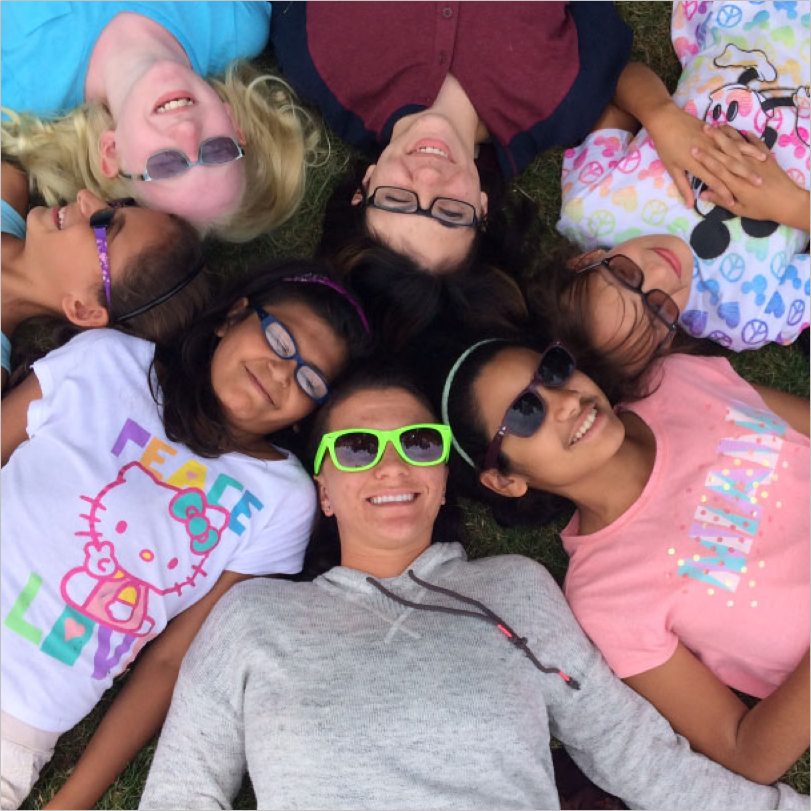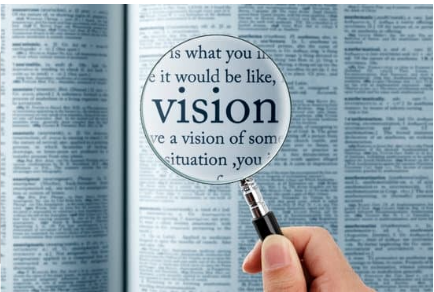(Narrator) The Top Five Keys to Successful Transition for DeafBlind Young Adults, presented by Debbie Fiderer, Coordinator of the Community Service Program at the Helen Keller National Center.
Video image description; a close-up of a woman speaking into the camera. To her right in a separate window is a sign language interpreter and above her is a power point.
The top five keys to successful transition for DeafBlind young adults. The first key component to successful transition is start early as early as you can. In the past it was common to begin transition services in the last year of high school. We’re not doing that anymore thank goodness. Current best practices encourage addressing the transition needs as early as possible.
This is supported by federal legislation and increased funding for services related to helping young people transition more successfully from high school to work or post-secondary education. So what does starting early mean? It means getting all your ducks in a row and identifying all of the resources that you’re going to want to take advantage of as your child gets older.
So, what agencies will be vital for your child’s success? Number one is the vocational rehab the VR agency that you’re going to utilize. Know what’s going on in your state. Here in New York, we have one Agency for people who are Deaf and have all other disabilities and there’s a completely separate agency, the Commission for the Blind for people who are blind.
Is there a state agency for individuals with developmental disabilities that your child would benefit from working with? You want to start really early in connecting with that kind of agency. Here in New York we have the Office for People with Developmental Disabilities. Getting the case open with them is an arduous and long process. It can take many, many months. So starting that process as early as possible and determining eligibility for your child. It’s very important to start early.
Are there local blindness services that you can Avail yourself of for example, do you live near NFB Training Center? Do you know of local agencies in your community that serve blind individuals perhaps there are residential programs that you’re aware of. Start gathering your resources contacting those agencies that you do know of and seeing they may have programs for young people that you’re not even aware of. Once you connect with the VR agency you will be given more information, but there’s nothing wrong with doing a little research beforehand on your own. Another key component of starting early is making sure you have your Social Security, your state identification, and all of those important government connections that your child would benefit from so when they turn 18 it’s important to apply for Social Security SSI if they’re eligible and to get a state identification, non-drivers ID from the DMV or whatever agency issues that in your state. This is important, even if the child will be in school until 21. There are many times in the child’s life where they’re going to need identification. So as early as you can get it that’s important. So, the number one key is start early in everything that you’re doing.
Number 2 and this is really important and something that I think is overlooked a lot; understand the difference between youth educational services and adult services. Services in the school are based on entitlement. Your child is entitled by law to an appropriate education. Now with the question of appropriate is for your child is going to be a negotiation.
This is going to be something that you’re going to and have been working on with your child, with the professionals, with the school probably for many years, but they’re going to get those services. You’re going to have IEP meetings. You’re going to have CSE meetings. And these things are going to be discussed between families and professionals but services will be provided.
While a student is in school take advantage of all of these services available. For example psychological testing will be required by future agencies that serve the DD population. So take advantage of that while they’re still in school. Adult Services are different. They’re based on eligibility. It is the individual’s responsibility to provide the information required to determine eligibility.
Again, this may include documentation of disability or even household financial information for vocational rehabilitation services. They may request documentation of legal residents in the United States. So, birth certificates, permanent legal residence cards… And so it’s very important to have all of this and have it ready to go know your responsibilities and be the squeaky wheel.
A VR counselor, vocational rehab counselor or say a college rep in the office for students with disabilities is not going to chase after you for information or chase after your child for information. State VR agencies and their vendors, which are private organizations, mostly not-for-profit, they have waiting lists, you know, they have a lot of people to serve.
So, if you miss an intake appointment or to nobody’s going to track you down. If you’re not there ready willing and eager to receive the services you’re going to miss out and often you’ll end up on the bottom of a long waiting list. If you don’t request the accommodations in college or go to the office for students with disabilities and discuss your needs you’re not going to get what you need to be successful.
So it’s very important that you become that squeaky wheel, you know what you need and you talk to the people who are going to get it for you. Know that it is your responsibility to provide the information that they need. To serve you better. So that’s number two, understanding it’s hard for parents to understand that when our children get older and they go into adult services the responsibility really shifts from the service provider to the individual. Preparing your child for that level of responsibility and helping them with it is of the highest importance.
The third key component to successful transition services; work work work and more work. I can’t stress that enough. Expose your child to as many different kinds of work as possible. Knowing what family and friends do for a living is so important. Activity is like visiting mom and dad’s workplace may have additional meaning for deaf blind kids who are not privy to the household conversations about our jobs from the everyday mundane complaints about traffic or colleagues to the happy reports about successes and accomplishments that we all share with our family.
Sometimes they’re DeafBlind kids, they’re not hearing all of that information. They’re not seeing that so any kind of exposure. You can give them to your workplace on Take Your Kids To Work Day or anything like that is so important. School-based and summer work experience essential. Some students will have access to internships and other vocational programming at school others may not especially if they’re on an academic track and the college bound. So, for all of those students you want to make sure they connect with the VR agency that can help with summer work experiences while they’re still in high school. It’s absolutely essential. Start slow with those experiences. Build on them. For a young person who’s 15 doesn’t have a lot of exposure to work it can be maybe once a week work try out or working at a local store. It could be maybe walking the neighbors dogs a couple of times a week for an hour or two here or there. Anything that gives them the sense of understanding they’re doing a job and they’re responsible for that job build on those experiences over time as the student develop skills and builds his or her stamina.
These can be anything as summer work experience can be tied to future work goals or it could just be a summer job. It could just be awake for a young person to earn a little extra cash just like their typical peers. Both can be valuable learning experiences and opportunities to develop work skills, communication strategies and self-advocacy skills.
One of the things I love when I see how our young DeafBlind students working at summer work experiences. Is that the young interns they haven’t experienced to be part of a team with other adults working towards a common goal whether it’s cleaning a store restocking clothing anything. This will be a lot of kids first experience with adults who are not teachers, service providers or caregivers in some capacity. So understanding that communication with colleagues is a peer-to-peer interaction. It’s not with a teacher or a caregiver. So there’s so many reasons why work is so important and we don’t want to take away from those opportunities. Start early every summer is an opportunity for kids to get real work experience. Learn what they like to do. And also what they don’t like to do. That’s just as important.
The fourth key component to successful transition Services is collaboration. Services available to your child may seem isolated from each other. Bring them together. It’s all about breaking down barriers. The school, vocational rehab, community partners, medical professionals, your family, you’re all on the same team do what you need to do to break down those barriers. So everybody feels comfortable being on that team.
Invite outside professionals to IEP meetings and to the school. For example, if your child is receiving mental health services, can those professionals collaborate with vocational staff providing a summer work experience? It may be very important for the employment specialist to understand the coping strategies that a counselor is working with the student on.
Or if the student is receiving orientation and mobility training in the community can the instructor visit the school, they should see what is their travel like in that environment and they might be able to offer suggestions to the school personnel. So making sure we break down these barriers that are sort of siloing or isolating the services that our kids are getting is crucial.
The last key component of successful transition services for DeafBlind young adults is developing those life skills and having a whole life approach to Independent Living. This is all about allowing. Our young people to attain the highest level of Independence at every stage of their young lives.
And this skill development needs to happen in the school the home and the community. Examples of our of the independent living skills that are essential, especially important to address for our deaf blind young adults can include; orientation and mobility, travel skills. This could range from learning how to go downstairs in their apartment building to get the mail to traveling outside to a summer job on their own time management. Are our kids waking up on time or is mommy coming in and tapping their shoulder every day to get up? Are they keeping track of their own appointments? Are they using a smartphone? Do they have a calendar book? Home management; making snacks, helping with family meals, chores keeping their personal space clean, doing their laundry. Are we expecting the same from are DeafBlind young people as we are from their brothers and sisters? And one essential piece of the puzzle for the DeafBlind kids is communication and interpersonal skills. Are they communicating for themselves or do mom and dad tend to do the talking for them? For example at the mall are they purchasing their own food at the food court like a typical 15-year old’s or waiting for mom and dad to take care of that for them? What communication skills do they use and do they have the skills to initiate communication and conversation with the hearing public? For all of this skill development training may be needed in the home and community.
So you want to partner with those community rehab providers who can help in these areas. VR (voc rehab) can and should sponsor these services for transition age youth. Also, it’s very important to ensure that there’s consistency through all life areas school, home and community. We have seen kids who are never left alone at school. They have one-on-one para with them at all times, while their parents are sending them off alone to pick up groceries a few blocks away at the neighborhood bodega in the Bronx. So clearly a disparity there and expectations that you want to eliminate. With the right training and supports our deaf blind young people will rise to the occasion.
They will reach and exceed the expectations we have for them. So we need to keep those expectations high and all the doors open to them.
We hope you found this helpful. For more information. Please contact Debbie Fiderer at DFiderer@helenkeller.org Please go to www.hawaii.edu can see for additional resources for transition age Youth and for providers. [End of Transcript]


